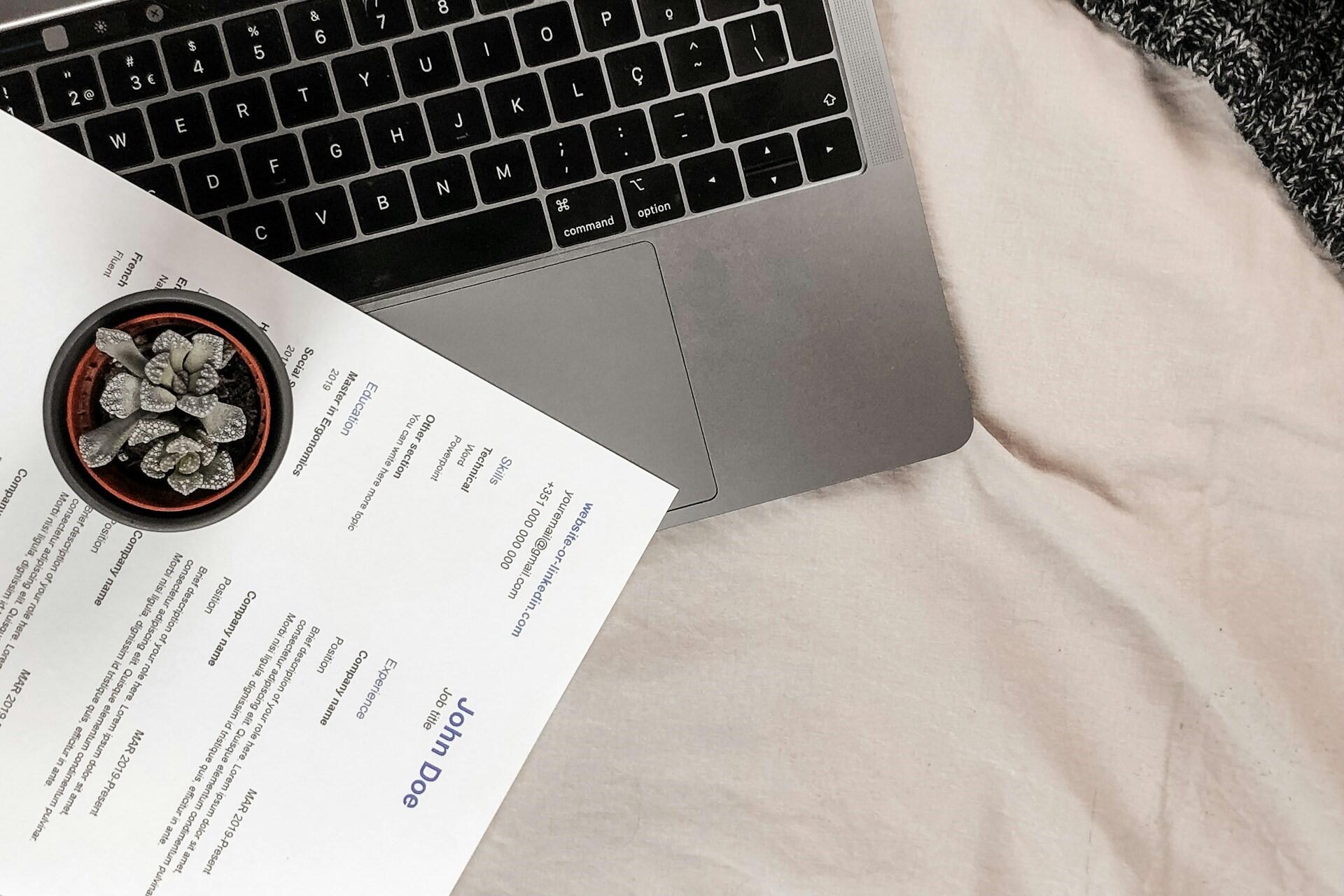A cover letter is an extra hurdle when applying for jobs, but it's the part that could land you the role. Your CV outlines qualifications and experience, while your cover letter explains why you want the job. Here's our guide to writing an effective cover letter with steps, tips, and examples.
Key Takeaways
- Cover letters are not always mandatory in Ireland. Still, they are widely expected and often read by employers, especially for competitive roles.
- A strong cover letter complements your CV by explaining your motivation, context, and suitability for a specific position.
- The most effective cover letters are tailored to the job description and supported by clear examples and outcomes.
- Irish employers generally expect cover letters to be concise, professional, and no longer than one page.
- Using a clear structure and adapting your tone for private or public sector roles can significantly improve your application.

Should I Write a Cover Letter for Jobs in Ireland?
While cover letters aren't always mandatory in Ireland (though resignation letters basically are), they're still widely expected, especially for competitive roles. A cover letter is a way to explain your motivation while highlighting your skills for the role. Even when marked as optional, submitting a cover letter can help your application stand out and demonstrate professionalism.

Before you start writing, take a few minutes to prepare appropriately. Read the job description carefully and identify the key skills, experience, and competencies the employer is looking for. Research the company's work, values, and communication style so your letter feels relevant rather than generic. Select two or three achievements that clearly demonstrate your suitability for the role, ideally supported by outcomes or results. Decide whether your cover letter will be submitted as part of an online application or sent by email, as this may affect formatting. Finally, double-check names, job titles, and spelling to ensure your application looks professional and considered from the outset.
Understanding the Purpose of a Cover Letter
A cover letter is a personal introduction. Employers can understand who you are beyond your qualifications and work history. Your CV (not to be confused with a resume) focuses on facts like education, experience, and achievements. At the same time, your cover letter explains context, motivation, and suitability for a role.
of hiring managers read them.

How to Write a Cover Letter: Step-by-Step
Break the process into clear, manageable steps, especially if this is for your first job. Each section of your letter should have a distinct purpose. Follow a structured approach so your letter is focused, easy to read, and relevant to the role.
A strong cover letter should clearly state the role you are applying for and explain why you are interested in both the position and the organisation. It should highlight your most relevant skills and experience, linking them directly to the job requirements and supporting them with specific examples. At the same time, avoid repeating your CV line by line or relying on vague, templated phrases that could apply to any role. Oversharing personal information or including irrelevant details can weaken your application. In Ireland, it is also good practice to keep your letter concise, focused, and aligned with professional norms.

Start by naming the role you're applying for and where you found it. Add one specific line that shows you have researched the employer and explain, briefly, why you want this role in particular. Keep it confident and direct, not generic.
Pick two or three requirements from the job description and match each one to a concrete example from your experience. Focus on outcomes and evidence, including numbers where possible (for example, time saved, revenue increased, customer satisfaction improved). This is where you show that you can do the job, not just claim you can.
Reconfirm your interest in the role and the value you would bring, then ask for the opportunity to discuss your application in an interview. Thank the reader for their time and sign off appropriately (for example, "Yours sincerely" if you used a name, or "Yours faithfully" if you did not). Keep the ending brief and polished.
of hiring managers make interview decisions
Cover Letter Structure and Formatting in Ireland
Cover letters shouldn't be longer than a page, they should just have enough information to secure an interview. The layout should be clear and professional. Include contact details, the date, and employer details. Avoid dense blocks of text and decorative fonts. Clarity, consistency, and relevance are all key.

Private Sector Cover Letters
Private sector employers in Ireland typically look for concise, tailored cover letters that clearly explain why you are a good fit for the role. Emphasis is placed on relevant skills, experience, and outcomes, with examples that show how you can add value to the organisation. The tone can be professional but personable, and applicants are encouraged to demonstrate motivation, cultural fit, and enthusiasm for the company.
Public Sector and Semi-State Cover Letters
Public sector and semi-state organisations often place greater emphasis on structure and evidence. Cover letters may need to address specific criteria or competencies outlined in the job description, using clear examples from past experience. The tone is usually more formal, and applicants should focus on demonstrating how they meet the required standards rather than selling personality or potential alone.
Cover Letter Examples for Irish Job Applications
Here are a few examples of applications. These are illustrative, and every cover letter, just like your CV, should be tailored to the role you're applying for. Our examples reflect common scenarios and should help you learn how to adapt your experience to suit graduate roles, career changes, or public sector positions.
Example of a Cover Letter: Graduate or Entry-Level Role
[Your Name]
[Your Address]
[City, County, Eircode]
[Phone Number] | [Email Address]
Date
Hiring Manager’s Name
[Company Name]
[Company Address]
[City, County]
Dear [Hiring Manager’s Name],
I am writing to express my interest in the Graduate Marketing Assistantposition advertised on IrishJobs.ie. I recently graduated from [University Name] with a BA in Marketing and Communications, where I developed strong analytical and creative skills that directly align with the requirements of this role.
During my degree, I completed a placement with [Company/Organisation], where I supported social media campaigns and assisted with content creation. This experience taught me how to balance creativity with data-driven decision-making for example, increasing Instagram engagement by 25% during a 10-week campaign. I also collaborated closely with cross-functional teams, enhancing both my teamwork and communication skills.
I am particularly drawn to [Company Name] for your commitment to innovative brand storytelling and community engagement, as demonstrated by your recent [specific campaign or initiative]. I would welcome the opportunity to contribute my passion for creative marketing and strong work ethic to your team.
Thank you for considering my application. I would like to discuss how my skills and enthusiasm can help [Company Name] achieve its goals.
Yours sincerely,
[Your Name]
To make your cover letter stand out, tailor your language to match the job advertisement's wording and demonstrate a clear understanding of the role. Use short paragraphs and a simple structure to make your letter easy to read, and focus on one strong example per paragraph rather than trying to cover everything at once. Where possible, include evidence such as figures, outcomes, or improvements you contributed to in previous roles. Keep your cover letter to one page, finish with a confident call to action, and proofread carefully to ensure consistency in tone, spelling, and terminology, particularly when using Irish English conventions.

Example of a Cover Letter: Career Change
If you're changing careers, you'll need a letter that outlines your motivations for changing careers and sets the stage for a subsequent interview.
[Your Name]
[Your Address] | [City, County, Eircode]
[Phone] | [Email]
Date
Dear [Hiring Manager’s Name],
I am writing to express my interest in the Project Coordinatorposition at [Company Name]. While my background has been in retail management, I am highly motivated to transition into project coordination, where I can apply my strong organisational skills and customer-focused mindset.
In my previous role as Store Manager at [Retail Company], I led a team of 12, oversaw scheduling, and managed several cross-functional projects from inventory roll-outs to training programmes all while maintaining high customer satisfaction. I achieved a 15% increase in quarterly salesand streamlined stock-taking procedures, demonstrating my ability to prioritise, plan, and deliver outcomes under tight deadlines.
What excites me about [Company Name] is your emphasis on structured project delivery and collaboration across teams. I am eager to bring my experience in team leadership, client liaison, and process improvement to your project team and to grow my skills in a new direction.
I would welcome the opportunity to discuss how my background could support your organisation’s objectives. Thank you for your time and consideration.
Kind regards,
[Your Name]
Cover Letter Example Ireland: Public Sector Style
Certain public sector roles have a lengthy application process, which is why your cover letter is as important as thanking people in a letter after each interview.
[Your Name]
[Your Address] | [City, County, Eircode]
[Phone] | [Email]
Date
Hiring Manager's Name
Department/Office
[Public Body Name]
Dear [Hiring Manager’s Name],
I am writing to apply for the Community Engagement Officerposition with [Public Body Name], advertised on publicjobs.ie. With a solid background in community outreach and a deep interest in public service, I would bring both passion and relevant experience to this role.
In my role as Community Support Assistant at [Organisation], I coordinated outreach programmes to enhance local participation in civic initiatives. I oversaw stakeholder communications, organised events that consistently saw attendance increases of 30–40%, and developed reporting templates that improved data accuracy by 20%. These experiences have strengthened my ability to work collaboratively, communicate clearly, and manage multiple responsibilities effectively.
I am especially drawn to this role because of [Public Body Name]’s commitment to inclusive community development and transparent governance. I would welcome the opportunity to contribute to efforts that support community engagement and enhance public trust.
I look forward to the opportunity to discuss how my skills and commitment align with your team's needs.
Yours faithfully,
[Your Name]
Getting Help with Your Cover Letter
If you need help writing a cover letter, your CV, or just writing in general, look for tutors on Superprof. Whatever skill or subject you need help with, you can find tutors in Ireland and around the world. With most offering a free first session, you can try a few before choosing the right one for you.
Summarise with AI:













